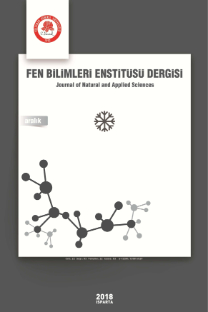Kutu Kesitli Kiriş-Kolon Birleşiminde Mesh Kalitesinin Şekil Değiştirmeye Etkisi
Ülkemizde meydana gelen son depremler sebebi ile çelik yapıların, betonarme yapılara göre kullanım oranı özellikle sanayi tipi yapılarda artış göstermiştir. Ancak çelik yapıların tercih edildiği yerler göz önünde bulundurulduğunda gerek mimari ve statik proje, gerekse de imalat ve montaj aşamasında görev alan teknik altyapı ülke geneline eşit oranda hizmet verememektedir. Bu sebeple proje, imalat ve uygulama hizmetleri yerel imkanlar ile çözümlenmeye çalışılmaktadır. Bu durum yapı tasarımında kolay erişilebilir ve işlenebilir olan kutu kesitli profilleri ön plana çıkarmaktadır. Ancak kutu kesitli profiller sahip oldukları kesit geometrisine bağlı olarak özellikle kesme ve eğilme yükleri etkisi altında istenmeyen lokal burkulma problemlerini de beraberinde getirmektedir. Kutu kesitli profiller kullanılarak oluşturulan çerçeve sistemlerde bu lokal burkulma problemleri hesaplarda öngörülmeyen kapasite kayıplarına neden olmakta olup özellikle sanayi tipi yapıları riskli kılmaktadır. Bu durum sismik hareketliliğin etkin olduğu ülkemizde depreme dayanıklı yapı tasarımında yapısal zaafların öngörülmesi ve buna göre dizayn edilmesinde de sayısal analiz programları ve bu programların çözüm algoritmasın doğru yönlendirilmesi ve yorumlanmasını önemli kılmaktadır. Bu çalışmada, Ansys sonlu elemanlar programı ile deneysel analizi tamamlanan bir numunenin sayısal modeli oluşturulmuş ve analiz edilmiştir. Deneysel analize göre doğrulanan sayısal model sabit yükleme düzeneği üzerinde farklı meshleme teknikleri ve çözüm komutları için analiz edilmiş ve gerçek davranış yakalanmaya çalışılmıştır. Bu kapsamda elde edilen sonuçlar karşılaştırılarak mesh tekniği ve mesh kalitesinin düğüm noktası davranışı üzerine etkisi gösterilmeye çalışılmıştır.
Anahtar Kelimeler:
Türk Deprem Yönetmeliği 2007, Dairesel Kesitli Kutu Profiller, CHS, Dikdörtgen Kesitli Kutu Profiller, RHS, Alın Levhalı Kaynaklı Moment Aktaran Birleşimler, Moment Aktaran Çelik Çerçeve Sistemler, Tersinir Statik Yükleme, Moment-Dönme İlişkisi, Süneklik Detayı, Ansys, Mesh Kalitesi
Mesh Quality Effect on Strain of Beam-Column Connections With Hallow-Sections
By the recent earthquakes occurred in our country, the utilization rate of the steel structure especially in the industrial structure has increased when compared to concrete structures. But when the places where steel construction preferred are considered; either architectural and statically project or technical infrastructure which participates in production and mounting steps can’t render service to country-wide equally. For this reason, design, manufacturing and application services are tried to be resolved by the local facilities. This situation is easily accessible in the building design and the hallow-section profiles were processed foreground. But hallow-section profiles bring local buckling problems under the effect of shearing force and bending loads together depending on their section geometry. Local buckling problems observed in frame systems formed by hollow-section profiles cause unpredictable capacity losses in the problems and lead to a risk for industrial structures. That’s why, numerical analysis programs as well as the appropriate management and interpretation of solution algorithms of these programs are crucial since it is possible to predict structural weaknesses in the design of buildings resistant to earthquake in Turkey where the seismic activity is widespread and thus designing buildings. In this present study, a sample which is completed experimental analysis is numerically modeled with ANSYS and analyzed. The numerical model which is verified by experimental analysis has tried to capture the real behavior and solution was analyzed for commands about different meshing techniques on the loading apparatus. Within this scope, the obtained results are compared and the effects of mesh technique and mesh quality on joint behavior is tried to be shown. 1. Giriş
Keywords:
Turkish Earthquake Code 2007, Circular Hollow Section Profiles, Rectangular Hollow Section Profiles, Box Section Beam Columns, End Plate Welded Moment Resisting Connections, Ductility Details, Moment Resisting Steel Frames, Cycling Static Loads, Moment – Rotation Relations, Ansys, Mesh Quality,
___
- Davies, G., Crockett, P., 1996. The Strength of Welded T-DT Joints In Rectangular and Circular Hollow Section Under Variable Axial Loads. Elsevier Science Ltd. 1996. Davies, G., 1998. Static Behaviour of Welded
- ISSN: 1300-7688
- Yayın Aralığı: Yılda 3 Sayı
- Başlangıç: 1995
- Yayıncı: Süleyman Demirel Üniversitesi
Sayıdaki Diğer Makaleler
FATMA ZERRİN SALTAN, HALE SEÇİLMİŞ CANBAY
Tek Kademeli Bir Derin Kuyu Pompasının Karakteristiklerinin Belirlenmesi
Sevgin ÖZDERİN, Hüseyin FAKİR, İlhami DÖNMEZ
Arduvaz ve Andezit'in Beton Agregası Olarak Kullanılabilirliğinin Araştırılması
Oktar SOYKAN, CENGİZ ÖZEL, CENK ÖCAL
Isparta-Senirkent Yöresi Orman Rehabilitasyon Sahalarının Başarı Durumu
Tek Kademeli Bir Derin Kuyu Pompası Karakteristiklerinin Deneysel Olarak Belirlenmesi
CENGİZ ÖZEL, MURAT KORU, Yüksel BAYRAM
Fonksiyonel Değişimli Çekirdeğe Sahip Üç Tabakalı Silindirik Kabukların Parametrik Titreşimi
SELÇUK TÜRKEL, Melek Müge TEVRİZCİ
Arduvaz ve Andezit'in Beton Agregası Olarak Kulanılabilirliğinin Araştırılması
